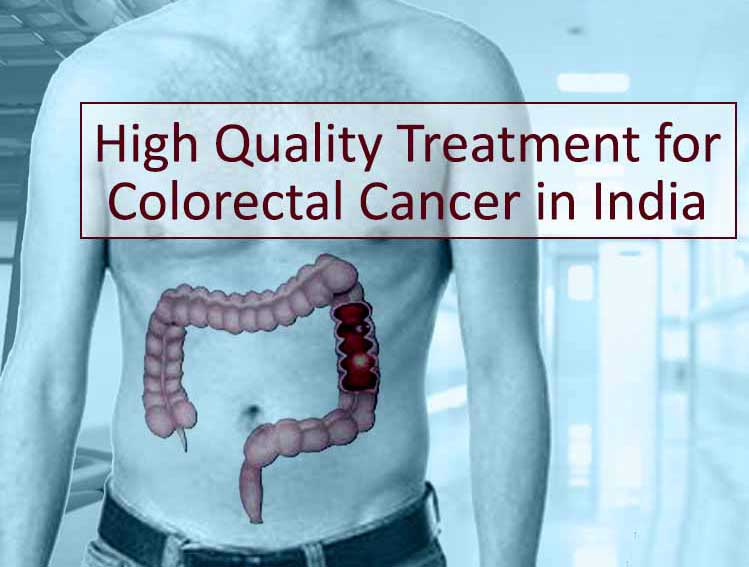
Though colorectal cancers are common in developed countries, the incidence is low in India, and intriguingly, the incidence is twice the rate in the rural group as compared to the urban population. Colorectal cancers rank third in frequency in men and second in women. They are the fourth leading cause of cancer mortality.
Etiology
The basis of colorectal cancer is the genetic change in the epithelial cells of mucosa. This is brought about by certain mutagens present in diets rich in red meat, especially those cooked by barbeque or grilled methods, and also diets rich in fat content.
Genetic risk factors
Some colorectal cancers occur on account of an inherent genetic defect, giving rise to two basic categories:
* Familial polyposis syndromes
* Hereditary non polyposis cancer
Signs and symptoms
- Bleeding per rectum
- Altered bowel habits (i.e., frequent constipation)
- Abdominal pain and distension
- Weight loss and fatigue
- Vomiting
- Anaemia
Evaluation
Through clinical examination and history, an oncologist pinpoints the diagnosis aided by:
- Fecal occult blood test
- Colonoscopy and biopsy
- CT scan, PET-CT scan (used to stage the disease)
Management
Localized colorectal cancers are managed by upfront surgery followed by chemo radiation if required. However, advanced cancers may require chemo-radiation to downstage the disease followed by surgery.
Surgical procedures typically individualized by site of colorectal cancers are:
- Hemicolectomy
- Proctocolectomy, where the diseased portion of the bowel along with its lymphatic drainage is removed and intestinal continuity restored by anastomosing the cut ends by sutures or staplers.
Rectal cancer
The surgical procedures for the rectum are far more intricate and for long have been dreaded because of the predominance of ablative procedures like abdominoperineal resections, which are associated with a permanent colostomy (i.e. a stoma on the surface on the abdomen through which all fecal contents are evacuated).
Sphincter saving procedures
These are designed to restore intestinal continuity after resection of the diseased segment so that the natural pathway is restored and patients do not need a colostomy. The procedures are:
* Anterior resection.
* Low anterior resection of rectum (upto 5cm from anal verge).
* Ultra low anterior resection (upto 2cm from anal verge).
Using these procedures, 90 per cent of rectal cancers can be treated and a colostomy is avoided. These procedures are facilitated by the use of staplers in some cases. Depending on the pathology report of the resected tumour, the exact stage and extent of the disease is known, and additional treatment in the form of radiotherapy and chemotherapy according to the stage is initiated.
Prognosis
As a thumb rule, all node negative cancers carry a greater than 60 per cent five year survival rate on an overall basis. In the early stages of the disease, more than 90 per cent cure rate can be achieved. Node positive cancers have less than 40 per cent five year survival rate. Even though the cure rates are good, colorectal cancers are the fourth leading cause of mortality. Therefore primary prevention is even more important than early diagnosis.
The following factors help to prevent colorectal cancer:
- High fibre diet (WHO recommendation – at least 25gm/day)
- Low fat diet
- Avoidance of red meat, barbequed/ grilled meat.
- Low alcohol intake.
- Avoidance of tobacco.
- Lifestyle changes – Increased aerobic exercises like running and jogging reduce obesity and the risk of colorectal cancers.
Secondary screening
It involves identification of high-risk populations:
- Age group of below 45 years
- Inherited colorectal cancer families
- Inflammatory bowel diseases (Ulcerative colitis, Crohn’s disease)
Screening of the groups for colorectal cancer needs to be carried out so that the disease can be detected at an early stage, and hence the cure rates can also be improved. Individuals above 45 years of age are recommended to undergo:
- Fecal occult blood testing yearly
- Colonoscopy once in three years
- Ultrasound abdomen once in three years
- The incidence of colorectal cancer can be significantly reduced by dietary and lifestyle changes. Screening leading to early detection of cancer will lead to higher cure rates and reduce mortality.
Get Free Expert Opinion Online from India’s Most Experienced Colorectal Cancer Specialists Right Now
Get FREE Cervical Cancer Treatment Cost Estimates from Top Hospitals in India.
We help you get FREE Expert Opinion from Top Doctors at Best Hospitals in All Major Cities in India.
We understand each patient is unique and therefore, we offer customised treatment packages that include medical visa assistance for international patients, assistance in certified hospital/doctor selection, finalising your appointments, etc and that too inclusive of room rent, consultation fees, investigation charges, nursing, diet and drugs.
So, no matter how complex is the surgery, we will help you choose a doctor considering your requirement, budget and availability.
Since our inception in 2010, we have helped many patients lead a normal and quality life. We assist you in choosing the best hospital in India, seeking an appointment with a qualified and experienced cancer specialist, explore your options, assist in a medical tourist visa, besides offering other services such as airport transfers, appoint an interpreter (if need be), etc.
If you have any further queries or in case you need any assistance, speak to the Case Manager or log on to our website at www.safemedtrip.com

 Click to WhatsApp
Click to WhatsApp +91-9899993637
+91-9899993637
























